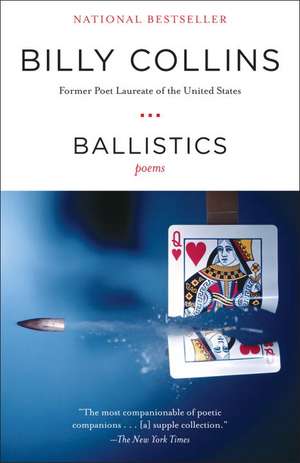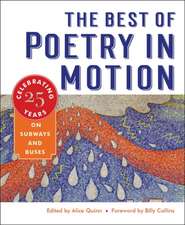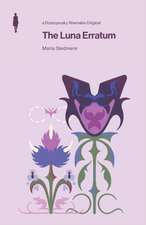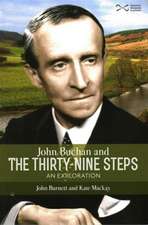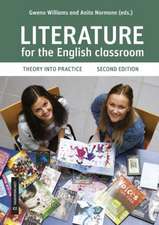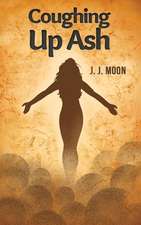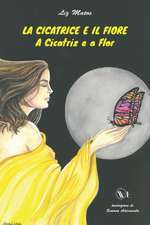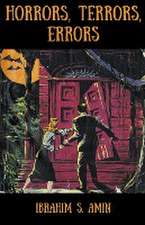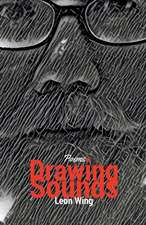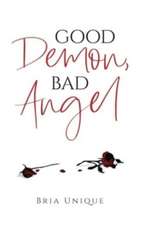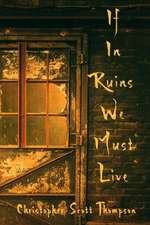Ballistics
Autor Billy Collinsen Limba Engleză Paperback – 31 ian 2010
Vezi toate premiile Carte premiată
Grand Canyon Reader Award (2013)
| Toate formatele și edițiile | Preț | Express |
|---|---|---|
| Paperback (2) | 41.96 lei 3-5 săpt. | |
| MacMillan – 2 iul 2009 | 41.96 lei 3-5 săpt. | |
| Random House Trade – 31 ian 2010 | 106.16 lei 3-5 săpt. |
Preț: 106.16 lei
Nou
Puncte Express: 159
Preț estimativ în valută:
20.32€ • 22.08$ • 17.08£
20.32€ • 22.08$ • 17.08£
Carte disponibilă
Livrare economică 31 martie-14 aprilie
Preluare comenzi: 021 569.72.76
Specificații
ISBN-13: 9780812975611
ISBN-10: 0812975618
Pagini: 112
Dimensiuni: 141 x 203 x 9 mm
Greutate: 0.11 kg
Editura: Random House Trade
Locul publicării:New York, NY
ISBN-10: 0812975618
Pagini: 112
Dimensiuni: 141 x 203 x 9 mm
Greutate: 0.11 kg
Editura: Random House Trade
Locul publicării:New York, NY
Notă biografică
Billy Collins is the author of eight collections of poetry, including The Trouble with Poetry, Nine Horses, Sailing Alone Around the Room, Questions About Angels, The Art of Drowning, and Picnic, Lightning. He is also the editor of Poetry 180: A Turning Back to Poetry and 180 More: Extraordinary Poems for Every Day. A distinguished professor of English at Lehman College of the City University of New York, he was Poet Laureate of the United States from 2001 to 2003 and Poet Laureate of New York State from 2004 to 2006.
From the Hardcover edition.
From the Hardcover edition.
Extras
Chapter One
Brightly Colored Boats Upturned
on the Banks of the Charles
What is there to say about them
that has not been said in the title?
I saw them near dawn from a glassy room
on the other side of that river,
which flowed from some hidden spring
to the sea; but that is getting away from
the brightly colored boats upturned
on the banks of the Charles,
the sleek racing sculls of a college crew team.
They were beautiful in the clear early light—
red, yellow, blue and green—
is all I wanted to say about them,
although for the rest of the day
I pictured a lighter version of myself
calling time through a little megaphone,
first to the months of the year,
then to the twelve apostles, all grimacing
as they leaned and pulled on the long wooden oars.
Searching
I recall someone once admitting
that all he remembered of Anna Karenina
was something about a picnic basket,
and now, after consuming a book
devoted to the subject of Barcelona—
its people, its history, its complex architecture—
all I remember is the mention
of an albino gorilla, the inhabitant of a park
where the Citadel of the Bourbons once stood.
The sheer paleness of her looms over
all the notable names and dates
as the evening strollers stop before her
and point to show their children.
These locals called her Snowflake,
and here she has been mentioned again in print
in the hope of keeping her pallid flame alive
and helping her, despite her name, to endure
in this poem where she has found another cage.
Oh, Snowflake,
I had no interest in the capital of Catalonia—
its people, its history, its complex architecture—
no, you were the reason
I kept my light on late into the night
turning all those pages, searching for you everywhere.
High
On that clear October morning,
I was only behind a double espresso
and a single hit of anti-depressant,
yet there, on the shore of the reservoir
with its flipped-over rowboats,
I felt like I was walking with Jane Austen
to borrow the jargon of the streets.
Yes, I was wearing the crown,
as the drug addicts like to say,
knitting a bonnet for Charlie,
entertaining the troops,
sitting in the study with H. G. Wells—
so many ways to express that mood
of royal goodwill
when the gift of sight is cause enough for jubilation.
And later in the afternoon
when I finally came down,
a lexicon was waiting for me there, too.
In my upholstered chair by a window
with dusk pouring into the room,
I appeared to be doing nothing,
but inside I was busy riding the marble,
as the lurkers like to put it,
talking to Marco Polo,
juggling turtles,
going through the spin cycle,
or—my favorite, if I had to have one—out of milk.
The Four-Moon Planet
I have envied the four-moon planet.
—The Notebooks of Robert Frost
Maybe he was thinking of the song
“What a Little Moonlight Can Do”
and became curious about
what a lot of moonlight might be capable of.
But wouldn’t this be too much of a good thing?
and what if you couldn’t tell them apart
and they always rose together
like pale quadruplets entering a living room?
Yes, there would be enough light
to read a book or write a letter at midnight,
and if you drank enough tequila
you might see eight of them roving brightly above.
But think of the two lovers on a beach,
his arm around her bare shoulder,
thrilled at how close they were feeling tonight
while he gazed at one moon and she another.
Evasive Maneuvers
I grew up hiding from the other children.
I would break off from the pack
on its patrol of the streets every Saturday
and end up alone behind a hedge
or down a dim hallway in a strange basement.
No one ever came looking for me,
which only added to the excitement.
I used to hide from adults, too,
mostly behind my mother’s long coat
or her floral dress depending on the season.
I tried to learn how to walk
between my father’s steps while he walked
like the trick poodle I had seen on television.
And I hid behind books,
usually one of the volumes of the encyclopedia
that was kept behind glass in a bookcase,
the letters of the alphabet in gold.
Before I knew how to read,
I sat in an armchair in the living room
and turned the pages, without a clue
about the worlds that were pressed
between D and F, M and O, W and Z.
Maybe this explains why
I looked out the bedroom window
first thing this morning
at the heavy trees, low gray clouds,
and said the word gastropod out loud,
and having no idea what it meant
went downstairs and looked it up
then hid in the woods from my wife and our dog.
August
The first one to rise on a Sunday morning,
I enter the white bathroom
trying not to think of Christ or Wallace Stevens.
It’s before dawn and the road is quiet,
even the birds are silent in the heat.
And standing on the tile floor,
I open a little nut of time
and nod to the cold water faucet,
with its chilled beaded surface
for cooling my wrists and cleansing my face,
and I offer some thanks
to the electricity swirling in the lightbulbs
for showing me the toothbrush and the bottle of aspirin.
I went to grammar school for Jesus
and to graduate school for Wallace Stevens.
But right now, I want to consider
only the water and the light,
always ready to flow and spark at my touch,
and beyond the wonders of this white room—
the reservoir high in the mountains,
the shore crowded with trees,
and the dynamo housed in a colossus of brick,
its bright interior, and up there,
a workman smoking alone on a catwalk.
Aubade
If I lived across the street from myself
and I was sitting in the dark
on the edge of the bed
at five o’clock in the morning,
I might be wondering what the light
was doing on in my study at this hour,
yet here I am at my desk
in the study wondering the very same thing.
I know I did not have to rise so early
to cut open with a penknife
the bundles of papers at a newsstand
as the man across the street might be thinking.
Clearly, I am not a farmer or a milkman.
And I am not the man across the street
who sits in the dark because sleep
is his mother and he is one of her many orphans.
Maybe I am awake just to listen
to the faint, high-pitched ringing
of tungsten in the single lightbulb
which sounds like the rustling of trees.
Or is it my job simply to sit as still
as the glass of water on the night table
of the man across the street,
as still as the photograph of my wife in a frame?
But there’s the first bird to deliver his call,
and there’s the reason I am up—
to catch the three-note song of that bird
and now to wait with him for some reply.
No Things
This love for the petty things,
part natural from the slow eye of childhood,
part a literary affectation,
this attention to the morning flower
and later in the day to a fly
strolling along the rim of a wineglass—
are we just avoiding the one true destiny,
when we do that? averting our eyes from
Philip Larkin who waits for us in an undertaker’s coat?
The leafless branches against the sky
will not save anyone from the infinity of death,
nor will the sugar bowl or the sugar spoon on the table.
So why bother with the checkerboard lighthouse?
Why waste time on the sparrow,
or the wildflowers along the roadside
when we should all be alone in our rooms
throwing ourselves against the wall of life
and the opposite wall of death,
the door locked behind us
as we hurl ourselves at the question of meaning,
and the enigma of our origins?
What good is the firefly,
the droplet running along the green leaf,
or even the bar of soap spinning around the bathtub
when ultimately we are meant to be
banging away on the mystery
as hard as we can and to hell with the neighbors?
banging away on nothingness itself,
some with their foreheads,
others with the maul of sense, the raised jawbone of poetry.
The First Night
The worst thing about death must be the first night.
—Juan Ramón Jiménez
Before I opened you, Jiménez,
it never occurred to me that day and night
would continue to circle each other in the ring of death,
but now you have me wondering
if there will also be a sun and a moon
and will the dead gather to watch them rise and set
then repair, each soul alone,
to some ghastly equivalent of a bed.
Or will the first night be the only night,
a darkness for which we have no other name?
How feeble our vocabulary in the face of death,
how impossible to write it down.
This is where language will stop,
the horse we have ridden all our lives
rearing up at the edge of a dizzying cliff.
The word that was in the beginning
and the word that was made flesh—
those and all the other words will cease.
Even now, reading you on this trellised porch,
how can I describe a sun that will shine after death?
But it is enough to frighten me
into paying more attention to the world’s day-moon,
to sunlight bright on water
or fragmented in a grove of trees,
and to look more closely here at these small leaves,
these sentinel thorns,
whose employment it is to guard the rose.
January in Paris
Poems are never completed—they are only abandoned.
—Paul Valéry
That winter I had nothing to do
but tend the kettle in my shuttered room
on the top floor of a pensione near a cemetery,
but I would sometimes descend the stairs,
unlock my bicycle, and pedal along the cold city streets
often turning from a wide boulevard
down a narrow side street
bearing the name of an obscure patriot.
I followed a few private rules,
never crossing a bridge without stopping
mid-point to lean my bike on the railing
and observe the flow of the river below
as I tried to better understand the French.
In my pale coat and my Basque cap
I pedaled past the windows of a patisserie
or sat up tall in the seat, arms folded,
and clicked downhill filling my nose with winter air.
I would see beggars and street cleaners
in their bright uniforms, and sometimes
I would see the poems of Valéry,
the ones he never finished but abandoned,
wandering the streets of the city half-clothed.
Most of them needed only a final line
or two, a little verbal flourish at the end,
but whenever I approached,
they would retreat from their makeshift fires
into the shadows—thin specters of incompletion,
forsaken for so many long decades
how could they ever trust another man with a pen?
I came across the one I wanted to tell you about
sitting with a glass of rosé at a café table—
beautiful, emaciated, unfinished,
cruelly abandoned with a flick of panache
by Monsieur Paul Valéry himself,
big fish in the school of Symbolism
and for a time, president of the Committee of Arts and Letters
of the League of Nations if you please.
Never mind how I got her out of the café,
past the concierge and up the flights of stairs—
remember that Paris is the capital of public kissing.
And never mind the holding and the pressing.
It is enough to know that I moved my pen
in such a way as to bring her to completion,
a simple, final stanza, which ended,
as this poem will, with the image
of a gorgeous orphan lying on a rumpled bed,
her large eyes closed,
a painting of cows in a valley over her head,
and off to the side, me in a window seat
blowing smoke from a cigarette at dawn.
two
Ballistics
When I came across the high-speed photograph
of a bullet that had just pierced a book—
the pages exploding with the velocity—
I forgot all about the marvels of photography
and began to wonder which book
the photographer had selected for the shot.
Many novels sprang to mind
including those of Raymond Chandler
where an extra bullet would hardly be noticed.
Nonfiction offered too many choices—
a history of Scottish lighthouses,
a biography of Joan of Arc and so forth.
Or it could be an anthology of medieval literature,
the bullet having just beheaded Sir Gawain
and scattered the band of assorted pilgrims.
But later, as I was drifting off to sleep,
I realized that the executed book
was a recent collection of poems written
by someone of whom I was not fond
and that the bullet must have passed through
his writing with little resistance
at twenty-eight hundred feet per second,
through the poems about his childhood
and the ones about the dreary state of the world,
and then through the author’s photograph,
through the beard, the round glasses,
and that special poet’s hat he loves to wear.
Pornography
In this sentimental painting of rustic life,
a rosy-cheeked fellow
in a broad hat and ballooning green pants
is twirling a peasant girl in a red frock
while a boy is playing a squeeze-box
near a turned-over barrel
upon which rest a knife, a jug, and a small drinking glass.
Two men in rough jackets
are playing cards at a wooden table.
And in the background a woman in a bonnet
stands behind the half-open Dutch door
talking to a merchant or a beggar who is leaning on a cane.
This is all I need to inject me with desire,
to fill me with the urge to lie down with you,
or someone very much like you,
on a cool marble floor or any fairly flat surface
as clouds go flying by
and the rustle of tall leafy trees
mixes with the notes of birdsong—
so clearly does the work speak of vanishing time,
obsolete musical instruments,
passing fancies, and the corpse
of the largely forgotten painter moldering
somewhere beneath the surface of present-day France.
Greek and Roman Statuary
The tip of the nose seemed the first to be lost,
then the arms and legs,
and later the stone penis if such a thing were featured.
And often an entire head followed the nose
as it might have done when bread
was baking in the side streets of ancient Rome.
No hope for the flute once attached
to the lips of that satyr with the puffed-out cheeks,
nor for the staff the shepherd boy once leaned on,
the sword no longer gripped by the warrior,
the poor lost ears of the sleeping boy,
and whatever it was Aphrodite once held in her severed hand.
Brightly Colored Boats Upturned
on the Banks of the Charles
What is there to say about them
that has not been said in the title?
I saw them near dawn from a glassy room
on the other side of that river,
which flowed from some hidden spring
to the sea; but that is getting away from
the brightly colored boats upturned
on the banks of the Charles,
the sleek racing sculls of a college crew team.
They were beautiful in the clear early light—
red, yellow, blue and green—
is all I wanted to say about them,
although for the rest of the day
I pictured a lighter version of myself
calling time through a little megaphone,
first to the months of the year,
then to the twelve apostles, all grimacing
as they leaned and pulled on the long wooden oars.
Searching
I recall someone once admitting
that all he remembered of Anna Karenina
was something about a picnic basket,
and now, after consuming a book
devoted to the subject of Barcelona—
its people, its history, its complex architecture—
all I remember is the mention
of an albino gorilla, the inhabitant of a park
where the Citadel of the Bourbons once stood.
The sheer paleness of her looms over
all the notable names and dates
as the evening strollers stop before her
and point to show their children.
These locals called her Snowflake,
and here she has been mentioned again in print
in the hope of keeping her pallid flame alive
and helping her, despite her name, to endure
in this poem where she has found another cage.
Oh, Snowflake,
I had no interest in the capital of Catalonia—
its people, its history, its complex architecture—
no, you were the reason
I kept my light on late into the night
turning all those pages, searching for you everywhere.
High
On that clear October morning,
I was only behind a double espresso
and a single hit of anti-depressant,
yet there, on the shore of the reservoir
with its flipped-over rowboats,
I felt like I was walking with Jane Austen
to borrow the jargon of the streets.
Yes, I was wearing the crown,
as the drug addicts like to say,
knitting a bonnet for Charlie,
entertaining the troops,
sitting in the study with H. G. Wells—
so many ways to express that mood
of royal goodwill
when the gift of sight is cause enough for jubilation.
And later in the afternoon
when I finally came down,
a lexicon was waiting for me there, too.
In my upholstered chair by a window
with dusk pouring into the room,
I appeared to be doing nothing,
but inside I was busy riding the marble,
as the lurkers like to put it,
talking to Marco Polo,
juggling turtles,
going through the spin cycle,
or—my favorite, if I had to have one—out of milk.
The Four-Moon Planet
I have envied the four-moon planet.
—The Notebooks of Robert Frost
Maybe he was thinking of the song
“What a Little Moonlight Can Do”
and became curious about
what a lot of moonlight might be capable of.
But wouldn’t this be too much of a good thing?
and what if you couldn’t tell them apart
and they always rose together
like pale quadruplets entering a living room?
Yes, there would be enough light
to read a book or write a letter at midnight,
and if you drank enough tequila
you might see eight of them roving brightly above.
But think of the two lovers on a beach,
his arm around her bare shoulder,
thrilled at how close they were feeling tonight
while he gazed at one moon and she another.
Evasive Maneuvers
I grew up hiding from the other children.
I would break off from the pack
on its patrol of the streets every Saturday
and end up alone behind a hedge
or down a dim hallway in a strange basement.
No one ever came looking for me,
which only added to the excitement.
I used to hide from adults, too,
mostly behind my mother’s long coat
or her floral dress depending on the season.
I tried to learn how to walk
between my father’s steps while he walked
like the trick poodle I had seen on television.
And I hid behind books,
usually one of the volumes of the encyclopedia
that was kept behind glass in a bookcase,
the letters of the alphabet in gold.
Before I knew how to read,
I sat in an armchair in the living room
and turned the pages, without a clue
about the worlds that were pressed
between D and F, M and O, W and Z.
Maybe this explains why
I looked out the bedroom window
first thing this morning
at the heavy trees, low gray clouds,
and said the word gastropod out loud,
and having no idea what it meant
went downstairs and looked it up
then hid in the woods from my wife and our dog.
August
The first one to rise on a Sunday morning,
I enter the white bathroom
trying not to think of Christ or Wallace Stevens.
It’s before dawn and the road is quiet,
even the birds are silent in the heat.
And standing on the tile floor,
I open a little nut of time
and nod to the cold water faucet,
with its chilled beaded surface
for cooling my wrists and cleansing my face,
and I offer some thanks
to the electricity swirling in the lightbulbs
for showing me the toothbrush and the bottle of aspirin.
I went to grammar school for Jesus
and to graduate school for Wallace Stevens.
But right now, I want to consider
only the water and the light,
always ready to flow and spark at my touch,
and beyond the wonders of this white room—
the reservoir high in the mountains,
the shore crowded with trees,
and the dynamo housed in a colossus of brick,
its bright interior, and up there,
a workman smoking alone on a catwalk.
Aubade
If I lived across the street from myself
and I was sitting in the dark
on the edge of the bed
at five o’clock in the morning,
I might be wondering what the light
was doing on in my study at this hour,
yet here I am at my desk
in the study wondering the very same thing.
I know I did not have to rise so early
to cut open with a penknife
the bundles of papers at a newsstand
as the man across the street might be thinking.
Clearly, I am not a farmer or a milkman.
And I am not the man across the street
who sits in the dark because sleep
is his mother and he is one of her many orphans.
Maybe I am awake just to listen
to the faint, high-pitched ringing
of tungsten in the single lightbulb
which sounds like the rustling of trees.
Or is it my job simply to sit as still
as the glass of water on the night table
of the man across the street,
as still as the photograph of my wife in a frame?
But there’s the first bird to deliver his call,
and there’s the reason I am up—
to catch the three-note song of that bird
and now to wait with him for some reply.
No Things
This love for the petty things,
part natural from the slow eye of childhood,
part a literary affectation,
this attention to the morning flower
and later in the day to a fly
strolling along the rim of a wineglass—
are we just avoiding the one true destiny,
when we do that? averting our eyes from
Philip Larkin who waits for us in an undertaker’s coat?
The leafless branches against the sky
will not save anyone from the infinity of death,
nor will the sugar bowl or the sugar spoon on the table.
So why bother with the checkerboard lighthouse?
Why waste time on the sparrow,
or the wildflowers along the roadside
when we should all be alone in our rooms
throwing ourselves against the wall of life
and the opposite wall of death,
the door locked behind us
as we hurl ourselves at the question of meaning,
and the enigma of our origins?
What good is the firefly,
the droplet running along the green leaf,
or even the bar of soap spinning around the bathtub
when ultimately we are meant to be
banging away on the mystery
as hard as we can and to hell with the neighbors?
banging away on nothingness itself,
some with their foreheads,
others with the maul of sense, the raised jawbone of poetry.
The First Night
The worst thing about death must be the first night.
—Juan Ramón Jiménez
Before I opened you, Jiménez,
it never occurred to me that day and night
would continue to circle each other in the ring of death,
but now you have me wondering
if there will also be a sun and a moon
and will the dead gather to watch them rise and set
then repair, each soul alone,
to some ghastly equivalent of a bed.
Or will the first night be the only night,
a darkness for which we have no other name?
How feeble our vocabulary in the face of death,
how impossible to write it down.
This is where language will stop,
the horse we have ridden all our lives
rearing up at the edge of a dizzying cliff.
The word that was in the beginning
and the word that was made flesh—
those and all the other words will cease.
Even now, reading you on this trellised porch,
how can I describe a sun that will shine after death?
But it is enough to frighten me
into paying more attention to the world’s day-moon,
to sunlight bright on water
or fragmented in a grove of trees,
and to look more closely here at these small leaves,
these sentinel thorns,
whose employment it is to guard the rose.
January in Paris
Poems are never completed—they are only abandoned.
—Paul Valéry
That winter I had nothing to do
but tend the kettle in my shuttered room
on the top floor of a pensione near a cemetery,
but I would sometimes descend the stairs,
unlock my bicycle, and pedal along the cold city streets
often turning from a wide boulevard
down a narrow side street
bearing the name of an obscure patriot.
I followed a few private rules,
never crossing a bridge without stopping
mid-point to lean my bike on the railing
and observe the flow of the river below
as I tried to better understand the French.
In my pale coat and my Basque cap
I pedaled past the windows of a patisserie
or sat up tall in the seat, arms folded,
and clicked downhill filling my nose with winter air.
I would see beggars and street cleaners
in their bright uniforms, and sometimes
I would see the poems of Valéry,
the ones he never finished but abandoned,
wandering the streets of the city half-clothed.
Most of them needed only a final line
or two, a little verbal flourish at the end,
but whenever I approached,
they would retreat from their makeshift fires
into the shadows—thin specters of incompletion,
forsaken for so many long decades
how could they ever trust another man with a pen?
I came across the one I wanted to tell you about
sitting with a glass of rosé at a café table—
beautiful, emaciated, unfinished,
cruelly abandoned with a flick of panache
by Monsieur Paul Valéry himself,
big fish in the school of Symbolism
and for a time, president of the Committee of Arts and Letters
of the League of Nations if you please.
Never mind how I got her out of the café,
past the concierge and up the flights of stairs—
remember that Paris is the capital of public kissing.
And never mind the holding and the pressing.
It is enough to know that I moved my pen
in such a way as to bring her to completion,
a simple, final stanza, which ended,
as this poem will, with the image
of a gorgeous orphan lying on a rumpled bed,
her large eyes closed,
a painting of cows in a valley over her head,
and off to the side, me in a window seat
blowing smoke from a cigarette at dawn.
two
Ballistics
When I came across the high-speed photograph
of a bullet that had just pierced a book—
the pages exploding with the velocity—
I forgot all about the marvels of photography
and began to wonder which book
the photographer had selected for the shot.
Many novels sprang to mind
including those of Raymond Chandler
where an extra bullet would hardly be noticed.
Nonfiction offered too many choices—
a history of Scottish lighthouses,
a biography of Joan of Arc and so forth.
Or it could be an anthology of medieval literature,
the bullet having just beheaded Sir Gawain
and scattered the band of assorted pilgrims.
But later, as I was drifting off to sleep,
I realized that the executed book
was a recent collection of poems written
by someone of whom I was not fond
and that the bullet must have passed through
his writing with little resistance
at twenty-eight hundred feet per second,
through the poems about his childhood
and the ones about the dreary state of the world,
and then through the author’s photograph,
through the beard, the round glasses,
and that special poet’s hat he loves to wear.
Pornography
In this sentimental painting of rustic life,
a rosy-cheeked fellow
in a broad hat and ballooning green pants
is twirling a peasant girl in a red frock
while a boy is playing a squeeze-box
near a turned-over barrel
upon which rest a knife, a jug, and a small drinking glass.
Two men in rough jackets
are playing cards at a wooden table.
And in the background a woman in a bonnet
stands behind the half-open Dutch door
talking to a merchant or a beggar who is leaning on a cane.
This is all I need to inject me with desire,
to fill me with the urge to lie down with you,
or someone very much like you,
on a cool marble floor or any fairly flat surface
as clouds go flying by
and the rustle of tall leafy trees
mixes with the notes of birdsong—
so clearly does the work speak of vanishing time,
obsolete musical instruments,
passing fancies, and the corpse
of the largely forgotten painter moldering
somewhere beneath the surface of present-day France.
Greek and Roman Statuary
The tip of the nose seemed the first to be lost,
then the arms and legs,
and later the stone penis if such a thing were featured.
And often an entire head followed the nose
as it might have done when bread
was baking in the side streets of ancient Rome.
No hope for the flute once attached
to the lips of that satyr with the puffed-out cheeks,
nor for the staff the shepherd boy once leaned on,
the sword no longer gripped by the warrior,
the poor lost ears of the sleeping boy,
and whatever it was Aphrodite once held in her severed hand.
Recenzii
“Collins reveals the unexpected within the ordinary. He peels back the surface of the humdrum to make the moment new.”
–The Christian Science Monitor
“Billy Collins demonstrates why he is one of our best poets, with his appealing trademark style: a self-deprecating charm, playful wit and unexpected imaginative leaps.”
–San Antonio Express-News
“By careful observation, Collins spins comic gold from the dross of quotidian suburban life. . . . Chipping away at the surface, he surprises you by scraping to the wood underneath, to some deeper truth.”
–Entertainment Weekly
“A poet of plentitude, irony, and Augustan grace.”
–The New Yorker
“It is difficult not to be charmed by Collins, and that in itself is a remarkable literary accomplishment.”
–The New York Review of Books
“Clever, subtle and engaging.”
–Pittsburgh Post-Gazette
From the Hardcover edition.
–The Christian Science Monitor
“Billy Collins demonstrates why he is one of our best poets, with his appealing trademark style: a self-deprecating charm, playful wit and unexpected imaginative leaps.”
–San Antonio Express-News
“By careful observation, Collins spins comic gold from the dross of quotidian suburban life. . . . Chipping away at the surface, he surprises you by scraping to the wood underneath, to some deeper truth.”
–Entertainment Weekly
“A poet of plentitude, irony, and Augustan grace.”
–The New Yorker
“It is difficult not to be charmed by Collins, and that in itself is a remarkable literary accomplishment.”
–The New York Review of Books
“Clever, subtle and engaging.”
–Pittsburgh Post-Gazette
From the Hardcover edition.
Descriere
In this moving and playful collection, Collins touches on an array of subjects--love, death, solitude, youth, and aging--delving deeper than ever before into the intricate folds of life.
Premii
- Grand Canyon Reader Award Recommended, 2013
